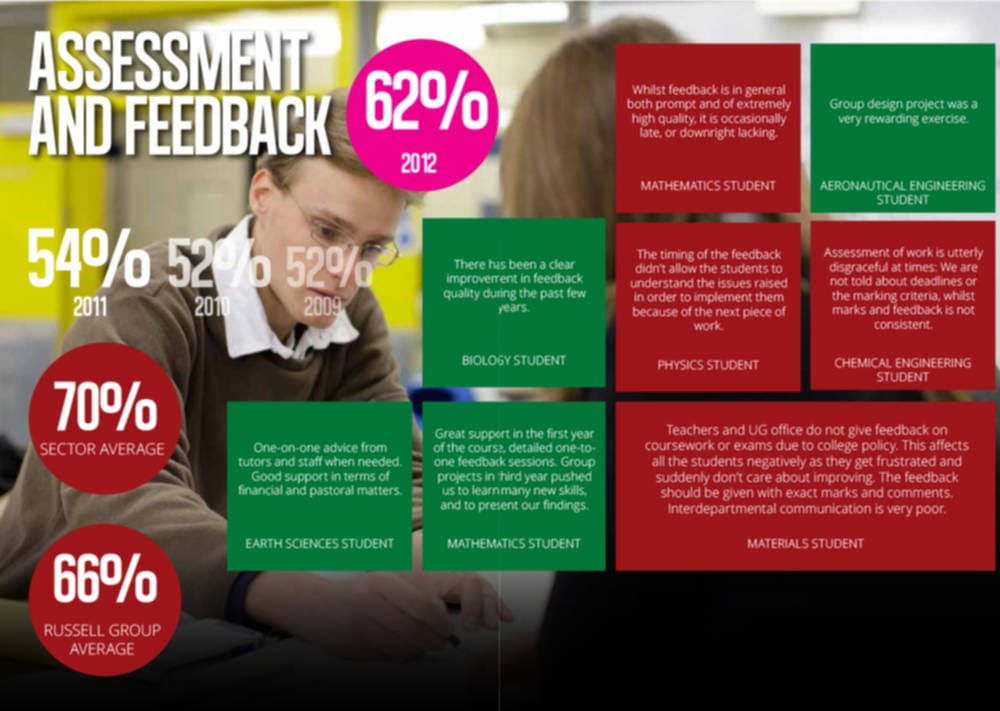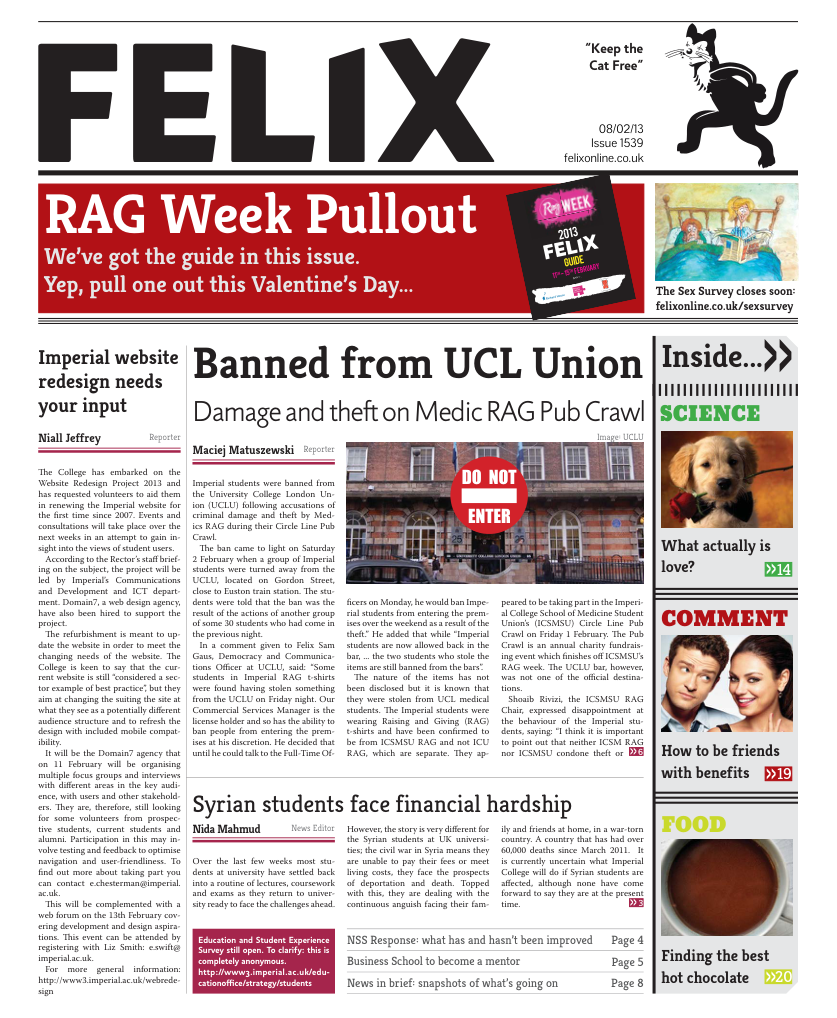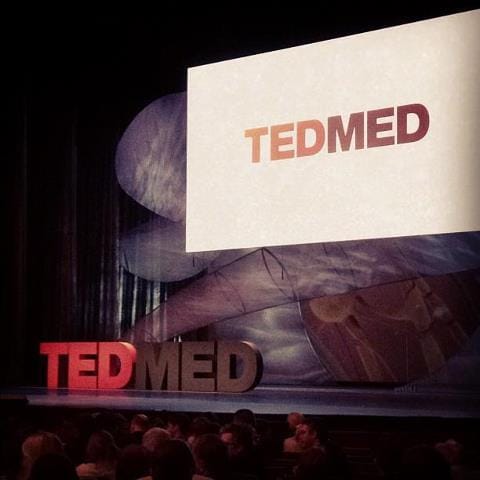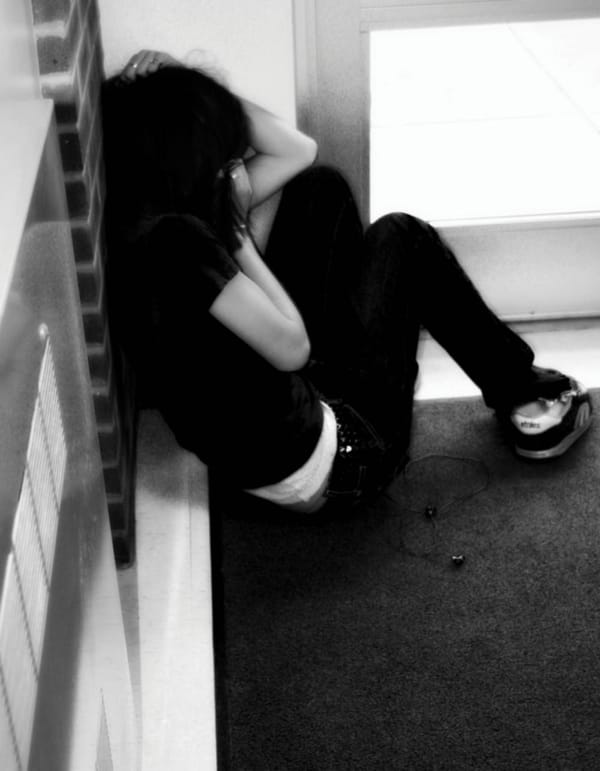NSS Response: what has changed
With the NSS in full swing this year, Yulia Negreskul sees where progress was made and not made on last year’s suggestions

The National Student Survey (NSS) is completed by every final year undergraduate student across the country and has been run since 2005 by HEFCE, an organisation responsible for public funding of English universities. Being the only way to assess student experience throughout their time in university on a national scale, it plays a crucial role in university ranking process and is widely held responsible for the poor performance in the Sunday Times League Table for 2012 entry, where Imperial lost 11 positions.
Following the NSS 2011 results, the Union President at the time Scott Heath, Deputy President (Education) Jason Parmer and the Representative Coordinator came up with a report, which provided 35 recommendations on how to improve student experience at Imperial. A year later current Union President Paul Beaumont and Deputy President (Education) Doug Hunt report on the progress made following those recommendations, as well as coming up with new ones to further improve student satisfaction. According to them, “Imperial College Union takes the NSS results seriously because we believe our students should be satisfied with the world class education they receive.’ They also note that ‘potential talented students should also not be deterred from applying to Imperial by looking at our national league table rankings, brought down by the NSS results.”
Some of the suggestions made by the Union were fully embodied by the College. When it comes to rewarding innovation in teaching there have been great improvements with the Union providing funding for a teaching awards system run by students. The Union plans to extend the awards to include research supervisors since over 20% of Imperial’s students are research postgraduates. Another success of the past year is the campaign ‘You Said, We Did’, which has been embraced by the College. Nevertheless, the Union feels that “further work is still necessary to completely convince students that the College takes SOLE seriously.” Furthermore, this year the Union President and Deputy President (Education) were invited to become members of the Strategic Education Committee, which determines overall education strategies across the College, and this allows them to become more engaged with decision making.
When it comes to rewarding innovation in teaching there have been great improvements with the Union providing funding for a teaching awards system run by students
All of these have possibly contributed to the improved NSS score in teaching, allowing Imperial to reach the national average. Nevertheless, a few other recommendations could be followed to further improve this aspect. For example, whilst staff are required to undertake courses when they start lecturing, further training is not always compulsory and varies between departments. The Union suggests that “baseline standards should be enforced across College, supplemented with frequent reviews.”
As for ‘Assessment and Feedback’, which is still College’s weakest section, with the satisfaction rates nearly 10% below the national average, ranking Imperial 143rd out of 168 HEIs, very few recommendations have been followed. This includes stricter deadlines to ensure prompt feedback, clearer marking criteria and weighting of each piece of coursework and exam, as well as making the assignments relevant rather than giving work ‘just for the sake of it’. However, the Union feels that ICT projects such as ‘custom’ systems, which could act as an alternative to Blackboard, could be used to improve the feedback and assessment programmes. Moreover, this year Deputy President (Education) and Deputy President (Welfare) became members of Representation & Welfare Board, which will help to “inform the student representatives of what is happening in higher education at a College and national level.”
When it comes to “Academic Support”, the Union feels that this section has been addressed the least regarding the recommendations made last year – buddies, moms and dads and other similar schemes don’t work well, resulting in lack of mutual academic support between different year groups. Consequently there is neither a feeling of community nor academic succession, which are particularly invaluable for those who are just starting their degree. The Union suggests that the departments organise social events so that ‘parents’ and ‘children’ could meet up.
When it comes to “Academic Support”, the Union feels that this section has been addressed the least regarding the recommendations made last year – buddies, moms and dads and other similar schemes don’t work well, resulting in lack of mutual academic support between different year groups
As for personal tutors, there are different approaches within the university, making it difficult to determine a tutor’s responsibilities. Furthermore, there is no proper feedback system to see how the tutors are doing. This means that the dissatisfied students, who are not likely to complain to the Senior Tutor, are never spotted. Furthermore, the Union feels that tutors should monitor the academic progress of their charges more closely and that the meetings should be timetabled and probably should take time in a less formal environment, further encouraging community spirit, which is that valued by the NSS.
Another problem that hasn’t been addressed in the past year is poor timetabling where sometimes students living across London need to come in only for one lecture. Moreover, last year the Union suggested moving timetable to a differentsoftware such as Optime or at least making it synchronize by default with calendars such as Outlook and iCal, to make the tracking of changes easy. Unfortunately this recommendation also hasn’t been taken up.
Major course changes are still not discussed with the student body, who are often not told about them, as one biochemistry student noted: “Students are generally not consulted or informed of significant changes to the course that directly affect them, or informed at the very last minute.” The Union highlights how important that is to avoid the scenario seen with the organization of Life sciences, which “attracted mass bad publicity.”
... there is no proper feedback system to see how the tutors are doing
“Learning resources” is by far the most successful of all the sections for Imperial with satisfaction at 92%, which is 10% above the sector average. Regardless of great efforts of some departments to provide lecture recordings and podcasts, it was suggested last year to allocate a few members of staff to e-learning to improve communication between ICT and the department. Unfortunately, it has not been implemented. Furthermore, the Union feels that ICT could be used to improve the rates of SOLE and NSS by pop-ups on College computers, for example, but this is something still to be seen. Nevertheless, when it came to the Library and the Union campaign to challenge unfair journal pricing, the College fully supported them.
In addition to the 35 made last year, three new recommendations were added and these include training of Graduate Teaching Assistants to improve their feedback quality as well as ‘best practice’ reports for each department, which reflect on the changes they’ve made. Furthermore, it has been suggested that the College invests more into the communication with students, as it will help to resolve many issues where students feel out of touch with the university.
“Learning resources” is by far the most successful of all the sections for Imperial with satisfaction at 92%, which is 10% above the sector average
Even though most recommendations haven’t been fully embraced by the College, some positive changes are seen as a result of these suggestions, which might well have contributed to the ranking for 2013 entry where Imperial has moved 6 positions in comparison to the previous year, making Imperial 8th.
College were contacted for comment and replied: “Feedback from Imperial College Union, both in the form of its NSS Response and through sabbaticals’ regular meetings with senior staff, is always taken seriously and helps inform improvements the College makes. Individual departments have prepared action plans focused on enhancing the student experience they offer – including looking at elements such as teaching approaches and assessment and feedback.”
The NSS Response can be seen here.







